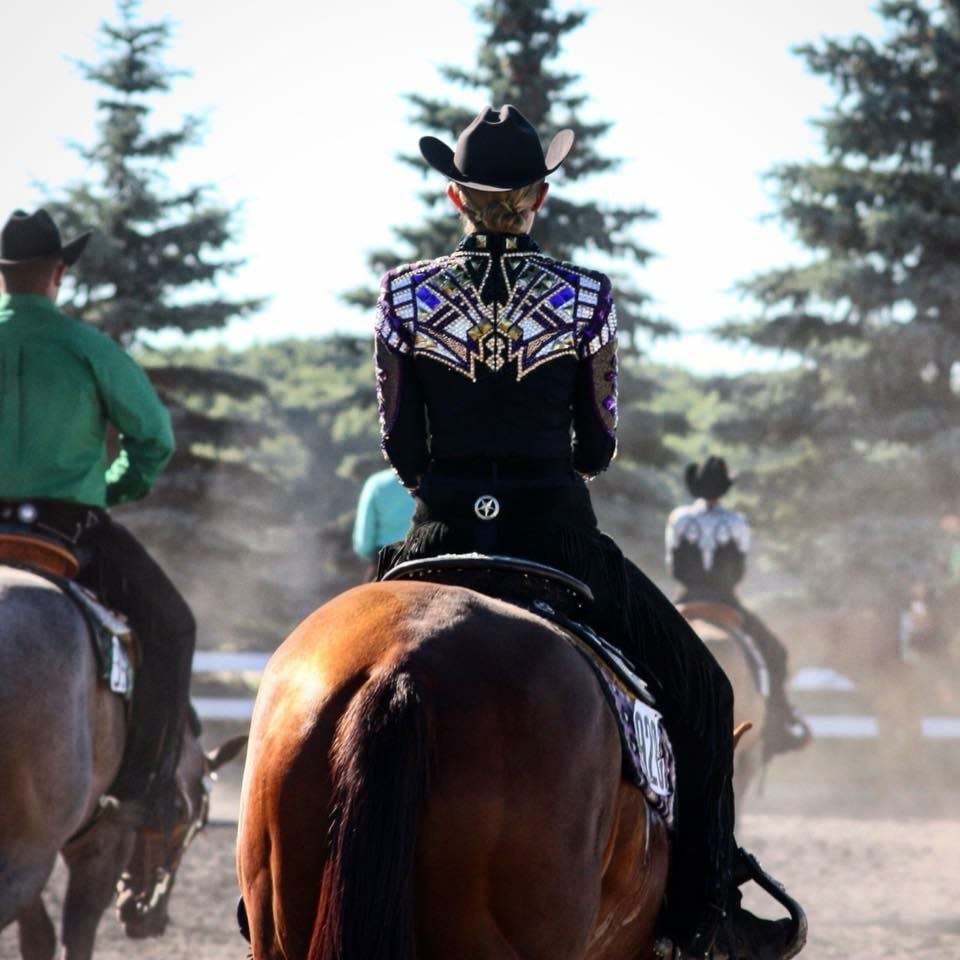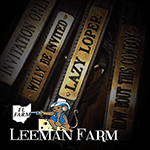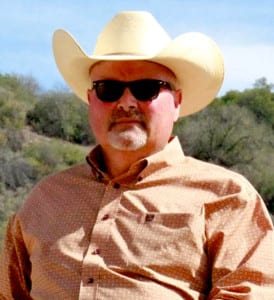Last week, GoHorseShow published Part 1 of the State of the Industry series where trainers, judges, breeders and exhibitors discussed positives in the industry. This week, some of the same individuals, plus a few others, explain what they would like to see improved.
Some of the topics included tweaking the leveling program, educating the masses about our industry, developing better horsemanship skills, horse shows being too long and increasing costs.
Read on to see what others in the industry had to say. Do you agree? Do you see other issues that need to be addressed? Let us know.
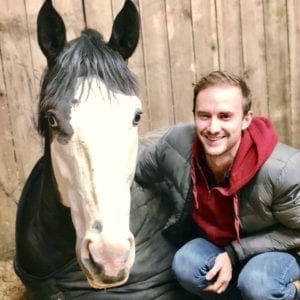 Julian Harris – I️ feel like we need better PR in regard to the rest of the sport horse community. The mindset of how these horses go by those who aren’t familiar with the sport is very backdated. We need better positive publicity and more support from within our industry that will shake us loose of this generalist perception of the horses being “lame”, “abused”, etc. Showcase a side of the pleasure horse that invites people to want to try it and provide understanding to those who have questions about the expectations we have for how our horses are supposed to travel.
Julian Harris – I️ feel like we need better PR in regard to the rest of the sport horse community. The mindset of how these horses go by those who aren’t familiar with the sport is very backdated. We need better positive publicity and more support from within our industry that will shake us loose of this generalist perception of the horses being “lame”, “abused”, etc. Showcase a side of the pleasure horse that invites people to want to try it and provide understanding to those who have questions about the expectations we have for how our horses are supposed to travel.
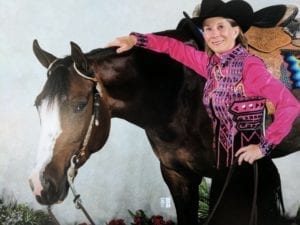 Debby Brehm – I see a big problem ahead for the industry. AQHA seems to have trouble getting exhibitors to step up to try Level 2 classes once they point out of Level 1. There still seems to be a fear that their horse isn’t good enough, their clothing isn’t “blingy” enough, or their saddle isn’t shiny enough to be able to compete. This is an area where all of us can help AQHA and our affiliates by encouraging those exhibitors we know to continue to show even after they are out of Level 1. If we don’t promote those newer exhibitors to keep coming to the shows and to keep trying, we could be facing a decline in the numbers in every class in the future. Growth is essential as people do stop showing, whether due to changes in health, finances or interest. Therefore, if we already have exhibitors at the shows, it should be easier to keep them coming back than to try to recruit new ones.
Debby Brehm – I see a big problem ahead for the industry. AQHA seems to have trouble getting exhibitors to step up to try Level 2 classes once they point out of Level 1. There still seems to be a fear that their horse isn’t good enough, their clothing isn’t “blingy” enough, or their saddle isn’t shiny enough to be able to compete. This is an area where all of us can help AQHA and our affiliates by encouraging those exhibitors we know to continue to show even after they are out of Level 1. If we don’t promote those newer exhibitors to keep coming to the shows and to keep trying, we could be facing a decline in the numbers in every class in the future. Growth is essential as people do stop showing, whether due to changes in health, finances or interest. Therefore, if we already have exhibitors at the shows, it should be easier to keep them coming back than to try to recruit new ones.
Unfortunately, there are a couple of negatives associated with Performance Halter, especially from the AQHA side. Currently, a horse must have a ROM to show in Performance Halter, and every year you need to get ten performance points to compete at the AQHA World Show. There was a proposal passed at the AQHA Convention stating that the horse doesn’t need those ten points every year to show at the World, nor a ROM to show at the shows. The only requirement was if you showed Performance Halter at any show you had to compete in a riding class at that show. This made perfect sense, but the AQHA Executive Committee tabled this idea for now. Instead of making it easier to show Performance Halter, AQHA continues to restrict it. This hurts class sizes and limits exhibitors. I know people who can’t ride enough to obtain ten points for a ROM or to show at the AQHA World Show but would love to show halter and ride in a class. The goal should always be to be as inclusive as possible, not exclusive. I hope AQHA reexamines Performance Halter because more people want to participate.
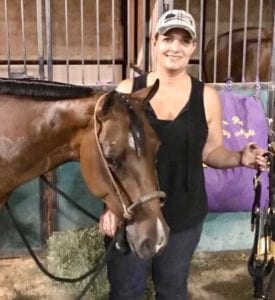 Kathryn deVries Mitchell – We are not getting entry-level competitors engaged, whether youth or amateur. The costs are frightening, and the ‘entry level’ classes are filled with ‘born again’ novices that have been showing for 20 years. I don’t have the answers, and I know AQHA is trying, but it’s the biggest issue I think we face.
Kathryn deVries Mitchell – We are not getting entry-level competitors engaged, whether youth or amateur. The costs are frightening, and the ‘entry level’ classes are filled with ‘born again’ novices that have been showing for 20 years. I don’t have the answers, and I know AQHA is trying, but it’s the biggest issue I think we face.
 Jane Backes – What’s going wrong is the number of shows like the Reichert that have gone away. We need more shows that have fun events, great prizes, good money and a large audience to promote the industry. For instance, the Junior Pleasure at most shows has about eight horses in them. Six of them are prior world champions. Makes it hard to get new people excited to show.
Jane Backes – What’s going wrong is the number of shows like the Reichert that have gone away. We need more shows that have fun events, great prizes, good money and a large audience to promote the industry. For instance, the Junior Pleasure at most shows has about eight horses in them. Six of them are prior world champions. Makes it hard to get new people excited to show.
Too many significant events are in the center of the country. I realize it sounds logical to be centrally located, but it comes with a price. The best trainers are migrating to the center of the nation leaving a void the farther the area is from the center of the country. Some disciplines that experienced popularity in remote regions have seen a decline because there are no trainers to seek out anymore.
Too many horse shows have become all-day marathons to compete and qualify. There is nothing for family members not participating in showing and little reason for local people to spectate and enjoy the horse show atmosphere. We need to think “outside the box” on how to get people to come to shows, have a good time and want to get involved.
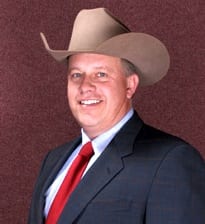 Wayne Halvorson – I think the WCHA and other organizations need to be more creative when trying to bring new halter people into the industry. I think we have been lacking in promoting the halter horse outside of the halter crowd, and we need to do more to get newcomers interested in the discipline. Halter classes are a great entry level class for new people to try, and we need to concentrate more on building up the membership of organizations like the WCHA. Also, the industry is having to compete with children participating in year-round sports leaving little time for them to show horses. My son competes in football and baseball, and he isn’t able to fit in showing much at this point.
Wayne Halvorson – I think the WCHA and other organizations need to be more creative when trying to bring new halter people into the industry. I think we have been lacking in promoting the halter horse outside of the halter crowd, and we need to do more to get newcomers interested in the discipline. Halter classes are a great entry level class for new people to try, and we need to concentrate more on building up the membership of organizations like the WCHA. Also, the industry is having to compete with children participating in year-round sports leaving little time for them to show horses. My son competes in football and baseball, and he isn’t able to fit in showing much at this point.
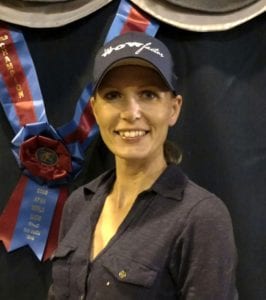 Nicole Dalton – A negative I see in the industry is the nastiness and meanness spread on social media every day. I don’t think people realize how much that discourages and pushes people away.
Nicole Dalton – A negative I see in the industry is the nastiness and meanness spread on social media every day. I don’t think people realize how much that discourages and pushes people away.
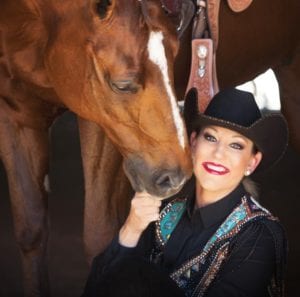 Julie Hoefling – I think leveling will always be something that needs attention and tweaking. However, I do believe some significant strides have been made to the program so far. I’m on the cusp of stepping up to Level 2 in a few classes, so for me, the spread of points between Level 2 and Level 3 seems to be pretty big. The range of exhibitors showing in Level 2 spans from fresh out of the Level 1 division to highly accomplished (in my opinion) so the thought of stepping up is a little intimidating in some cases. I understand how the point ranges are determined. However, I think some further analysis on this might help to tighten the gap and make the stepping up process a little more gradual. A new division is always going to be challenging, but I think the point of the leveling program is to give confidence to those exhibitors as they progress through the levels, so a more gradual approach may help. It may also help some Level 3 class sizes which tend to be on the small side at many of the shows I attend.
Julie Hoefling – I think leveling will always be something that needs attention and tweaking. However, I do believe some significant strides have been made to the program so far. I’m on the cusp of stepping up to Level 2 in a few classes, so for me, the spread of points between Level 2 and Level 3 seems to be pretty big. The range of exhibitors showing in Level 2 spans from fresh out of the Level 1 division to highly accomplished (in my opinion) so the thought of stepping up is a little intimidating in some cases. I understand how the point ranges are determined. However, I think some further analysis on this might help to tighten the gap and make the stepping up process a little more gradual. A new division is always going to be challenging, but I think the point of the leveling program is to give confidence to those exhibitors as they progress through the levels, so a more gradual approach may help. It may also help some Level 3 class sizes which tend to be on the small side at many of the shows I attend.
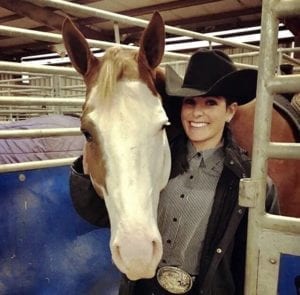 Erica Greathouse – From mostly an APHA perspective, with leasing being legal, there are fewer young horses being made into all-around horses. In the past, many youth and amateurs invested in younger horses and were a part of the process of developing them into all-around horses. These days, there are a lot more people leasing finished horses and not as many young prospects being developed. I think this negatively impacts breeding and showing because it makes the pool of up-and-coming all-around horses smaller and the market not as strong for prospects. In my opinion, it also makes the riders (while seasoned exhibitors), less savvy equestrians.
Erica Greathouse – From mostly an APHA perspective, with leasing being legal, there are fewer young horses being made into all-around horses. In the past, many youth and amateurs invested in younger horses and were a part of the process of developing them into all-around horses. These days, there are a lot more people leasing finished horses and not as many young prospects being developed. I think this negatively impacts breeding and showing because it makes the pool of up-and-coming all-around horses smaller and the market not as strong for prospects. In my opinion, it also makes the riders (while seasoned exhibitors), less savvy equestrians.
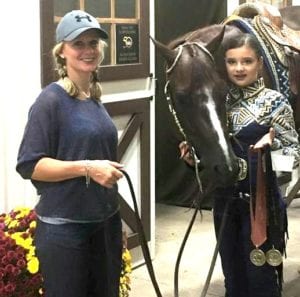 Missy Thyfault – I don’t like the idea of rookie riders needing to be on rookie horses. To me, that makes no sense. I would always prefer a broke solid horse for a rookie. I think the rookie program itself is an excellent idea for the rider. I missed the days when the shows were over earlier, but I don’t know what the solution is to that. I know show management does the best they can to keep things running quickly and efficiently. Shows are just so big these days.
Missy Thyfault – I don’t like the idea of rookie riders needing to be on rookie horses. To me, that makes no sense. I would always prefer a broke solid horse for a rookie. I think the rookie program itself is an excellent idea for the rider. I missed the days when the shows were over earlier, but I don’t know what the solution is to that. I know show management does the best they can to keep things running quickly and efficiently. Shows are just so big these days.
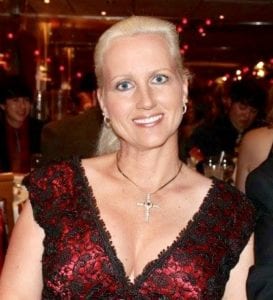 Leigh Ann Griffith – A negative that I see in the industry today is the near disappearance of the major riding academies. The cost to provide horses, facilities, equipment and staffing has become so astronomical, they are becoming nearly extinct. As many of these programs have disappeared, or are pushed well outside the convenience of suburbia, we are providing fewer entry-level options that have developed the interest and talent of many who have gone on to be successful in this industry. It is also becoming increasingly difficult to find quality instructors. My experience is that college equestrian programs are developing “trainers,” and fewer good teaching professionals are emerging. We have to be mindful of where it all begins.
Leigh Ann Griffith – A negative that I see in the industry today is the near disappearance of the major riding academies. The cost to provide horses, facilities, equipment and staffing has become so astronomical, they are becoming nearly extinct. As many of these programs have disappeared, or are pushed well outside the convenience of suburbia, we are providing fewer entry-level options that have developed the interest and talent of many who have gone on to be successful in this industry. It is also becoming increasingly difficult to find quality instructors. My experience is that college equestrian programs are developing “trainers,” and fewer good teaching professionals are emerging. We have to be mindful of where it all begins.
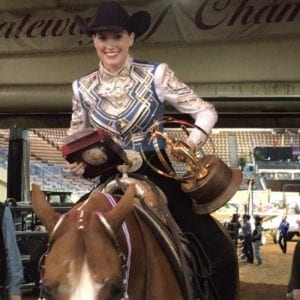 Hillary Roberts – Of course, an area that can always be improved upon is the negativity stemming from lack of education about what we do. Social media is the primary culprit. I think it’s essential for our industry and associations to educate the public and present a united front that’s proud of our product.
Hillary Roberts – Of course, an area that can always be improved upon is the negativity stemming from lack of education about what we do. Social media is the primary culprit. I think it’s essential for our industry and associations to educate the public and present a united front that’s proud of our product.
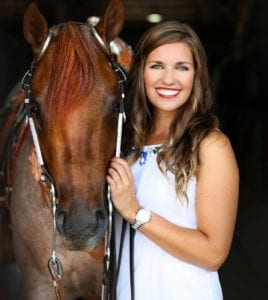 Lauren Stanley – It’s so expensive! I understand that a lot of the rising costs come from external circumstances (show grounds charging more, states charging more, bedding prices increase, etc.) but it’s sometimes a little hard to swallow. Flat fee shows are looking more and more attractive since we can enter as many classes as we like and the numbers seem to be shortcuts because of that.
Lauren Stanley – It’s so expensive! I understand that a lot of the rising costs come from external circumstances (show grounds charging more, states charging more, bedding prices increase, etc.) but it’s sometimes a little hard to swallow. Flat fee shows are looking more and more attractive since we can enter as many classes as we like and the numbers seem to be shortcuts because of that.
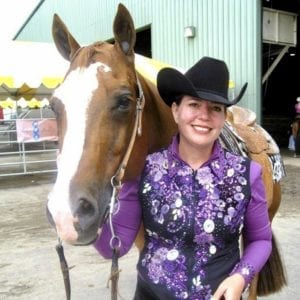 Hilary Reinhard – AQHA needs to take a firmer stance on abuse or cheating that has been substantiated. It is very rare that someone gets in trouble for serious offenses. It is frustrating to those of us who follow the rules and disappointing that AQHA does not seem to care if everyone does. So many things are swept under the table.
Hilary Reinhard – AQHA needs to take a firmer stance on abuse or cheating that has been substantiated. It is very rare that someone gets in trouble for serious offenses. It is frustrating to those of us who follow the rules and disappointing that AQHA does not seem to care if everyone does. So many things are swept under the table.
The gene pool for our horses has narrowed due to a few factors. The allowance of shipped semen, while arguably a good thing, has killed the regional studs. Now people breed to just a handful of studs. And buyers will rarely take the time to look at a prospect unless it is by one of those studs. I’m afraid this will cause consequences down the road.
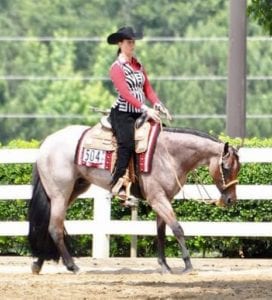 Adrienne Cober Dickerson – We priced the middle class out of competing at a high level, from saddles, show costs, show clothing, to the prices of horses.
Adrienne Cober Dickerson – We priced the middle class out of competing at a high level, from saddles, show costs, show clothing, to the prices of horses.
Our judges are our peers.
Too many breed shows are close to each other on the same weekend, makes it hard to have big horse shows, and when you lose the numbers, you lose the atmosphere that draws new people.
Futurities are disappearing. If there’s nowhere to show, why train up young horses?
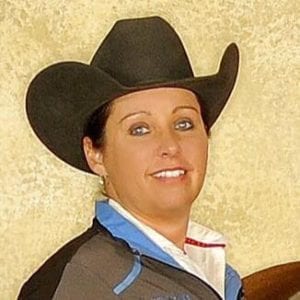 Heather Young – People criticizing other disciplines. I see and hear this all the time. People need to understand that the discipline they are criticizing is someone else’s passion. I think as an industry, we need to support our fellow horsemen/women and see the positives in other disciplines.
Heather Young – People criticizing other disciplines. I see and hear this all the time. People need to understand that the discipline they are criticizing is someone else’s passion. I think as an industry, we need to support our fellow horsemen/women and see the positives in other disciplines.
 Lainie DeBoer – I think the biggest struggle we continue to have in the AQHA is basic horsemanship. There seems to be an increasing lack of knowledge when it comes to riding, health care and training. We live in a quick fix society and working with horses when appropriately done is far from quick. We have gotten away from our roots of taking the time to do it right. I do sit on the AQHA Welfare Commission, and things have improved, but we can do better in our industry. There needs to be more education in all areas available that is helping promote the welfare of our horse. We need to get people interested in improving their skills and getting back to the basics, not feeling like they need to take shortcuts in training to win the blue ribbon. I see these horses becoming more of a vehicle than being treated as living creatures.
Lainie DeBoer – I think the biggest struggle we continue to have in the AQHA is basic horsemanship. There seems to be an increasing lack of knowledge when it comes to riding, health care and training. We live in a quick fix society and working with horses when appropriately done is far from quick. We have gotten away from our roots of taking the time to do it right. I do sit on the AQHA Welfare Commission, and things have improved, but we can do better in our industry. There needs to be more education in all areas available that is helping promote the welfare of our horse. We need to get people interested in improving their skills and getting back to the basics, not feeling like they need to take shortcuts in training to win the blue ribbon. I see these horses becoming more of a vehicle than being treated as living creatures.
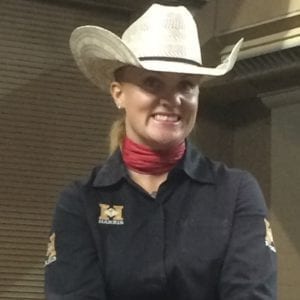 Katy Jo Zuidema – I wish AQHA were an advocate for the horse trainer as well as the horse. It seems like every chance they have to stand up for us; they bow down to the uneducated on the internet. I’m not saying we’re all perfect, but we’re not all abusive and inappropriate either. I appreciate very much how NSBA makes us feel welcome and gives us a chance to correct ourselves before shaming us or changing rules. An example of this is equipment. I can be soft-handed in a big bridle or a steel hackamore or a set of draw reins. But when you take those away from us, we have to pull harder, and to me, that looks worse for public perception than anything.
Katy Jo Zuidema – I wish AQHA were an advocate for the horse trainer as well as the horse. It seems like every chance they have to stand up for us; they bow down to the uneducated on the internet. I’m not saying we’re all perfect, but we’re not all abusive and inappropriate either. I appreciate very much how NSBA makes us feel welcome and gives us a chance to correct ourselves before shaming us or changing rules. An example of this is equipment. I can be soft-handed in a big bridle or a steel hackamore or a set of draw reins. But when you take those away from us, we have to pull harder, and to me, that looks worse for public perception than anything.
I wish we made more money for how hard we work. We work harder than President Trump’s lawyers, and we make 1/10 what a lawyer makes.
I wish they could invent a better trailer tire. We can put a man on the moon, but we can’t make trailer tires that don’t blow? I think it’s all a conspiracy of some sort.
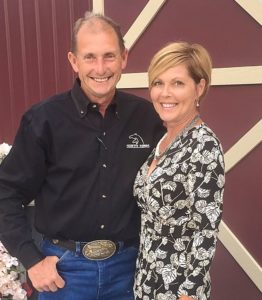 Debbi Trubee – I hate that the true weekend shows are a thing of the past. Local weekend shows allowed so many more opportunities for folks with lesser skill sets and/or horses to be able to go and get good placings and points. With the significant circuits now taking over, it doesn’t allow for participation from folks who may not have the means to be gone showing for a week at a time at shows that can be primarily as competitive as mini Congresses.
Debbi Trubee – I hate that the true weekend shows are a thing of the past. Local weekend shows allowed so many more opportunities for folks with lesser skill sets and/or horses to be able to go and get good placings and points. With the significant circuits now taking over, it doesn’t allow for participation from folks who may not have the means to be gone showing for a week at a time at shows that can be primarily as competitive as mini Congresses.
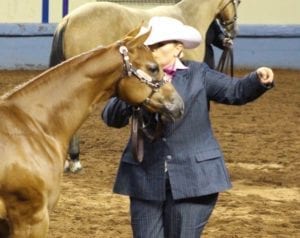 Amanda Wallinger-Rowan – While I love all the opportunities that the halter futurities create, I think they need to be spread out more during the year. They all seem to be in the fall and back-to-back which is very difficult for me because I work. It is tough to take five weeks in a row off of vacation time to show at all of these events.
Amanda Wallinger-Rowan – While I love all the opportunities that the halter futurities create, I think they need to be spread out more during the year. They all seem to be in the fall and back-to-back which is very difficult for me because I work. It is tough to take five weeks in a row off of vacation time to show at all of these events.
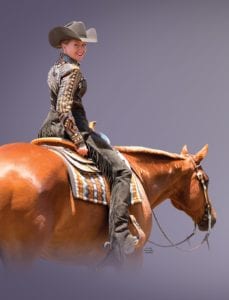 Beckie Peskin – I think losing the Incentive Fund was tough and will hurt smaller shows long term. At this point, other than the small number who are hauling for a title, once folks get qualified or finish a superior, etc, they are pumping the brakes. There isn’t an incentive to keep showing. That being said, if there is no money, there is no money. I wasn’t involved in it so without knowing the full details that drove the decision, it’s hard to judge.
Beckie Peskin – I think losing the Incentive Fund was tough and will hurt smaller shows long term. At this point, other than the small number who are hauling for a title, once folks get qualified or finish a superior, etc, they are pumping the brakes. There isn’t an incentive to keep showing. That being said, if there is no money, there is no money. I wasn’t involved in it so without knowing the full details that drove the decision, it’s hard to judge.
One small thing that’s wrong and I don’t understand why it wouldn’t be an easy fix: Level 2 Year-End High Points. For example, points earned in any amateur class (leveled or not) count toward qualifying for the AQHA World Show in both Levels 2 and 3. But only points earned in a Level 2 class count for the Level 2 Year-End High Point. Why? There isn’t a whole lot of incentive for most shows to level classes – more paperwork, more hassle, more awards. Points earned in a non-leveled class should theoretically be harder to win, so why not let them count toward the high point just like they count toward qualifying? It dramatically limits the award to those that are near the handful of leveled shows.
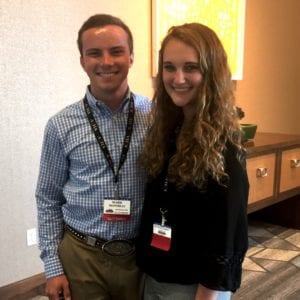 Mark Mowbray – In our industry, I feel that we have misplaced what this is indeed about. I know that this may be an unpopular opinion, but I think that there are too many shows. We have to put more focus on building up affiliates, or we will suffer in the long run. By allowing members to benefit from horse shows, we will only grow as an organization. It is difficult for affiliates to have shows when they have to compete for dates, availability and the possibility of making a profit.
Mark Mowbray – In our industry, I feel that we have misplaced what this is indeed about. I know that this may be an unpopular opinion, but I think that there are too many shows. We have to put more focus on building up affiliates, or we will suffer in the long run. By allowing members to benefit from horse shows, we will only grow as an organization. It is difficult for affiliates to have shows when they have to compete for dates, availability and the possibility of making a profit.
Another issue that I consistently think about is the state of our Professional Horsemen. In my opinion, I believe AQHA should make becoming a Professional Horseman more exclusive to those who may not have had the years of experience that most professionals have. It should be a privilege to be an AQHA Professional Horseman, not a right. As we progress in our industry, we will continue to have more individuals that would like to train and work for a living within this line of work, which is excellent. However, we need to start evaluating what it truly means to be a professional. In the future, we should reserve the title of Professional Horseman for those who have an established business, work ethic, maturity and ability to produce positive results in any aspect of our industry.
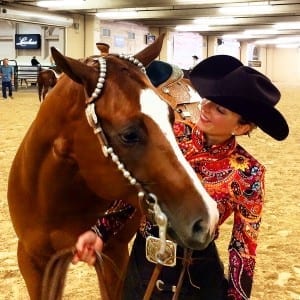 Lena Sailor Berry – Too often we get caught up in points we are chasing, or the perfection of the pattern in the next class because it is easy to do. Remembering why we are all here, getting to participate in these events and live the life we do with our equine counterparts is crucial to the survival of the industry in a way we can all be proud of. These horses allow us to be a part of their lives and to ride them. They trust us to direct and lead them. Their participation comes without the luxury of a “voice,” so it is up to us to watch and listen carefully to what they tell us with the language they do speak. It is our responsibility to put them first and make the tough choices when their wellbeing is on the line. We owe it to them to always be fair and to love them for the amazing animals they are. We all get what it feels like to have those rides that keep us coming back for more, but the more shouldn’t come at the expense of our beloved partners. No single path or program works for all, but if we choose to listen and react with fairness and kindness, the partnership is sure to be fulfilling.
Lena Sailor Berry – Too often we get caught up in points we are chasing, or the perfection of the pattern in the next class because it is easy to do. Remembering why we are all here, getting to participate in these events and live the life we do with our equine counterparts is crucial to the survival of the industry in a way we can all be proud of. These horses allow us to be a part of their lives and to ride them. They trust us to direct and lead them. Their participation comes without the luxury of a “voice,” so it is up to us to watch and listen carefully to what they tell us with the language they do speak. It is our responsibility to put them first and make the tough choices when their wellbeing is on the line. We owe it to them to always be fair and to love them for the amazing animals they are. We all get what it feels like to have those rides that keep us coming back for more, but the more shouldn’t come at the expense of our beloved partners. No single path or program works for all, but if we choose to listen and react with fairness and kindness, the partnership is sure to be fulfilling.
What aspects of the horse industry would you like to see improved? Let us know.


